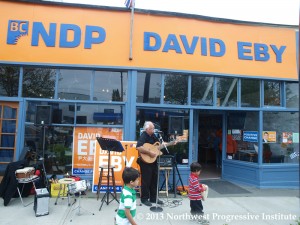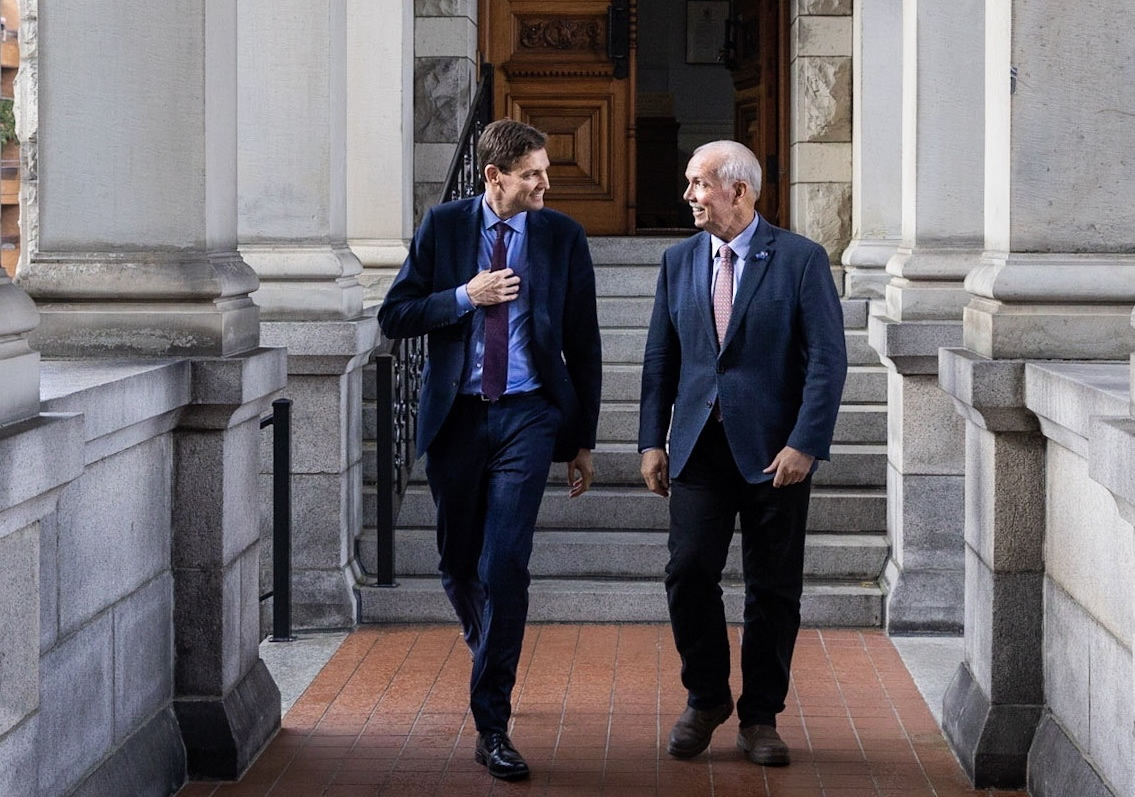David Eby, forty-six, will be sworn in as British Columbia’s thirty-seventh premier at Government House in Victoria on November 18th, culminating the trickiest political surgery in a parliamentary system of government – the head transplant.
Having held a trio of demanding Cabinet portfolios in the B.C. government, Eby will succeed Premier John Horgan. Horgan submitted his resignation to Lieutenant Governor Janet Austin earlier this week, and recommended Eby as his successor.
British Columbians do not directly elect their premier. They elect a governing body, the Legislative Assembly, with the winning party forming government and its leader becoming premier. The left-of-center New Democratic Party holds a comfortable fifty-seven seat majority in the Legislature.
It is possible to make a mess of transition, picking an unpopular leader or spilling party blood, as Britain’s Conservatives have demonstrated.
The Tories are on their third prime minister of the past three months.
The New Democrats expected to anoint Eby after fellow legislators withdrew from a possible challenge. But a climate activist, Anjai Appadurai, entered the election by party members of Horgan’s successor. Her campaign brazenly violated rules by which new members are signed up in anticipation of a leadership vote.
Members of the opposition Green Party were recruited to take out memberships in the NDP, and outside groups became involved in pushing her candidacy.
Appadurai was disqualified by the party’s chief electoral officer.
Media peppered Horgan with critical questions when the outgoing premier tried to take a victory lap after five mostly successful years in office. Horgan, sixty-two, is bowing out after a bout of throat cancer which sapped his energy.
The New Democrats have two years left in their election mandate, but Eby is acting like a person who needs to act immediately. He is promising one hundred days of action, on pressing problems ranging from climate to housing.
The first government decision came Thursday, weeks before the new premier’s swearing in. After Vancouver hosted the 2010 Winter Olympics, the province has decided not to support a bid to host the 2030 winter games. The government weighed “its costs, its risks, its potential benefits against government priorities like health care, like public safety, investing in the cost of living,” Tourism Minister Lisa Beare told the Legislature. The cabinet’s choice, “putting people first.”
As in “the States,” crime has become a big issue in the Great White North. The opposition (not-very-liberal) Liberal Party has used Question Period to bombard the Legislature with stories of violent assault, notably crimes committed by offenders on parole.
Eby is a former director of the B.C. Civil Liberties Association and the Canadian HIV/AIDS Legal Network. The new premier, an Ontario native, began his legal career working in Vancouver’s addiction-plagued Downtown East Side.
He has promised to press Canada’s federal government for action.
“One of the challenges that we face is we can’t direct Crown Counsel (prosecutors) to violate federal criminal law,” Eby said last week. “My position is that violent offenders should be kept in jail. As leader of the BC NDP you will see me advocating with the federal government to make sure that the criminal code, and the federal laws, correspond with what British Columbians want.”
Veteran British Columbia journalist Rob Shaw wrote recently: “Eby better have a plan, room in the budget and some serious political capital to spend solving the crime issue. Because every day he waits, the political damage to his government gets worse.”
It has become very expensive to live in British Columbia, often dubbed Canada’s “lotus land” for its mellow climate (compared to the rest of the country) and Vancouver’s status as an international city and gateway to the Pacific.
Vancouver regularly ranks on top-five lists of the world’s best cities in which to live – if you can afford it.
Eby has vowed to deliver. talking of a tax on homes purchased by speculators and then quickly put back on the market. For those finding it tough to rent and impossible to buy housing, “we will deliver that housing for you,” he promised last week in a speech. “For the people living in the streets, absolutely.”
“These are not small matters that can be resolved overnight,” he said in a recent letter to the province’s 400,000-member civil service. Without help of public sector employees, “we won’t be successful in this effort.”

Eby represents the riding (electoral district) of Vancouver-Point Grey in the Legislature. He won his seat by beating the Liberals’ then-Premier Christy Clark in the 2013 election.
The Liberals won, but Clark had to find another riding in which to run.
With his base in Vancouver, Eby must master a variety of political microclimates in a province larger than Texas.
The Interior favors resource development and votes conservative. Vancouver Island leans left, where the Green Party has contested New Democrats for environmental minded voters.
In a late 2020 election, the NDP scored major breakthroughs in the Lower Fraser Valley, the Vancouver suburb of Richmond, and North Vancouver. The party with deep left-labor roots won an impressive victory in the suburbs.
Eby has already unveiled a team of advisers that is largely new and young. He is expected to revamp the cabinet before being sworn in and will face the Legislature on November 21st. No time to waste.

